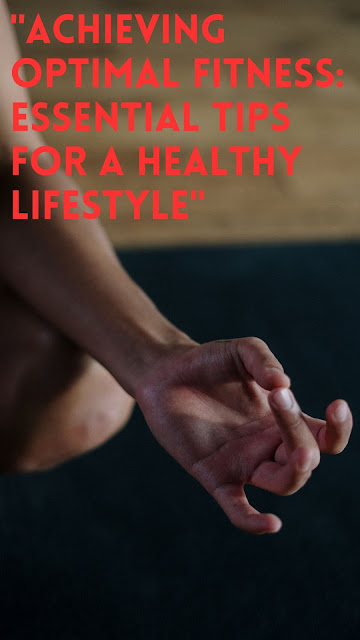Achieving Optimal Fitness: Essential Tips for a Healthy Lifestyle
In today's fast-paced world, maintaining optimal fitness and adopting a healthy lifestyle is more important than ever. By incorporating healthy habits into our daily routine, we can improve our overall well-being, boost energy levels, and enhance our quality of life. Achieving optimal fitness requires a holistic approach, encompassing nutrition, exercise, rest, mental well-being, and positive lifestyle habits. In this article, we will explore these essential tips to help you embark on your journey towards a healthier and fitter you.
Nutrition for a Healthy Lifestyle
When it comes to achieving optimal fitness, nutrition plays a vital role. A well-balanced diet rich in essential nutrients is the foundation of a healthy lifestyle. Make sure to include a variety of fruits, vegetables, whole grains, lean proteins, and healthy fats in your meals. This will provide your body with the necessary macronutrients and micronutrients to function optimally.
Hydration is also key to maintaining good health. Drink an adequate amount of water throughout the day to stay properly hydrated. Water helps regulate body temperature, aids digestion, and supports various bodily functions. Remember to listen to your body's thirst signals and drink water accordingly.
Boost your health and immunity with Tonic Green - the ultimate superfood packed with nutrients to help you feel your best
Boost your health and immunity with Tonic Green - the ultimate superfood packed with nutrients to help you feel your best
Exercise and Physical Activity
Regular exercise is a cornerstone of optimal fitness. Aim for at least 150 minutes of moderate-intensity aerobic activity or 75 minutes of vigorous-intensity aerobic activity each week. This can include activities such as brisk walking, jogging, cycling, swimming, or dancing. Engaging in regular exercise not only helps in weight management but also strengthens the heart, boosts mood, and improves overall cardiovascular health.
In addition to aerobic exercise, incorporate strength training exercises into your routine. Strength training helps build lean muscle mass, increases bone density, and improves overall body strength. It can involve weightlifting, bodyweight exercises, or resistance band workouts. Remember to start with lighter weights or resistance and gradually increase as you progress.
Rest and Recovery
While exercise is essential, rest and recovery are equally important. Allow your body time to recover and repair itself after physical activity. Include rest days in your exercise schedule to prevent overexertion and reduce the risk of injury. During rest days, focus on gentle activities such as stretching, yoga, or leisurely walks to promote active recovery.
Quality sleep is crucial for optimal fitness and overall well-being. Aim for 7-9 hours of uninterrupted sleep each night. Sleep helps in muscle recovery, improves cognitive function, and boosts immune system function. Create a bedtime routine, maintain a comfortable sleep environment, and avoid electronic devices before bed to promote better sleep hygiene.
To manage stress effectively, incorporate stress-relief techniques into your daily routine. This can include practices such as meditation, deep breathing exercises, or engaging in hobbies you enjoy. Prioritize self-care and give yourself time to relax and rejuvenate.
Mental Well-being
Achieving optimal fitness goes beyond physical health; it also encompasses mental well-being. The mind-body connection is powerful, and taking care of your mental health is crucial for overall well-being. Practice mindfulness and meditation to help reduce stress, increase self-awareness, and improve mental clarity. Incorporate positive affirmations and engage in activities that bring you joy and fulfillment.
Managing stress and reducing anxiety are vital for maintaining a healthy lifestyle. Find healthy outlets to manage stress, such as exercise, spending time in nature, or talking to a supportive friend or family member. Consider seeking professional help if stress or anxiety becomes overwhelming.
Lifestyle Habits for Optimal Fitness
Adopting healthy lifestyle habits can significantly contribute to achieving optimal fitness. Avoid tobacco products and limit alcohol consumption. Tobacco use increases the risk of various health conditions, including heart disease and cancer. Excessive alcohol consumption can negatively impact your overall health and fitness goals.
Sedentary behavior should be minimized. Find ways to incorporate physical activity throughout the day, such as taking the stairs instead of the elevator, going for short walks during breaks, or using a standing desk. Small changes can make a big difference in leading an active lifestyle.
Building healthy habits and consistency are key to long-term success. Set realistic goals, create a schedule, and stick to it. Celebrate small victories along the way to keep yourself motivated. Surround yourself with a supportive community that shares your goals and values.
Monitoring Progress
Conclusion
Embarking on a journey towards optimal fitness and a healthy lifestyle is a transformative endeavor. By incorporating the essential tips outlined in this article—focusing on nutrition, exercise, rest, mental well-being, positive lifestyle habits, and monitoring progress—you can pave the way for a healthier and fitter version of yourself. Remember, every small step counts, and the key is to start and stay committed. Prioritize your well-being, and let your journey toward optimal fitness begin. English




No comments:
Post a Comment